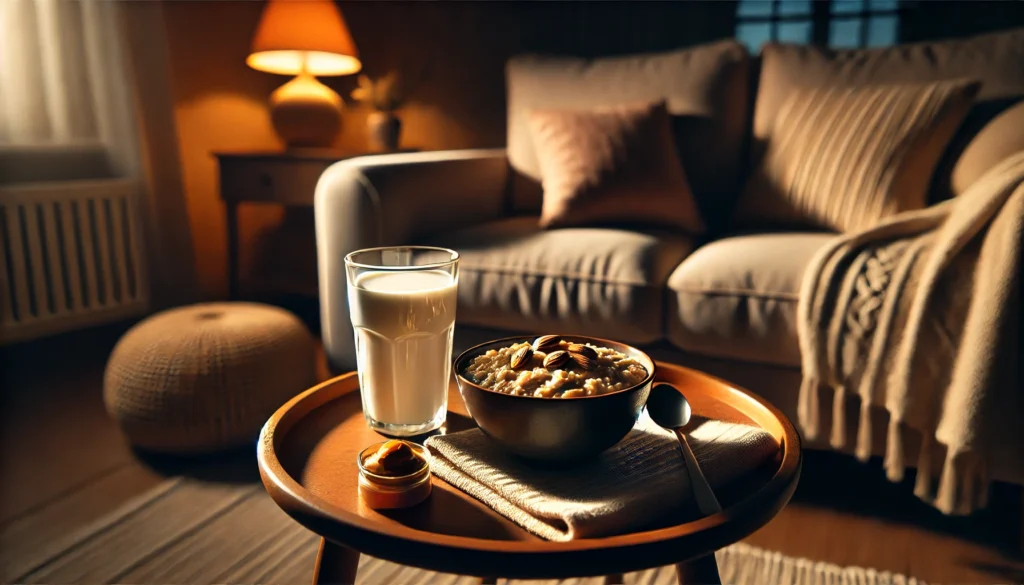In the quest for a good night’s sleep, many individuals explore various dietary interventions. One such consideration is peanut butter. This beloved spread, a staple in many households, has sparked curiosity around its potential effects on sleep. Can peanuts make you sleepy, or do they have the opposite effect? Let’s delve into the science behind peanut butter and its potential impact on sleep quality.
You May Also Like: Essential Vitamins for Better Sleep Quality
The Nutritional Profile of Peanut Butter
To understand how peanut butter might affect sleep, it’s essential to first examine its nutritional components. Peanut butter is rich in various nutrients that can influence sleep patterns and overall health.
Proteins: Building Blocks for Repair
Proteins in peanut butter are vital for muscle repair and growth. They provide essential amino acids that the body cannot produce on its own. While proteins are mainly known for supporting muscle health, they also play a role in hormone production, including hormones that regulate sleep.
Proteins help in stabilizing blood glucose levels, which can prevent nighttime awakenings due to hypoglycemia. Consuming a protein-rich snack like peanut butter before bed might contribute to a more stable sleep cycle by minimizing disruptions.
Healthy Fats: Heart and Sleep Health
Peanut butter is a source of healthy fats, predominantly monounsaturated and polyunsaturated fats. These fats are beneficial for heart health and can influence sleep quality by reducing inflammation and supporting a healthy metabolism.
Fats slow down digestion, providing a sustained energy release. This can prevent sudden hunger pangs during the night, promoting uninterrupted sleep. Additionally, fats support the absorption of fat-soluble vitamins, some of which play roles in sleep regulation.
Vitamins and Minerals: Sleep Regulation Essentials
Peanut butter contains several vitamins and minerals, including magnesium, which is crucial for sleep regulation. Magnesium aids in muscle relaxation and nerve function, which can help improve sleep quality.
Magnesium deficiency has been linked to insomnia and restless sleep. Including magnesium-rich foods like peanut butter in your diet can potentially enhance sleep by contributing to a calm and relaxed state conducive to falling asleep.
The Role of Tryptophan
Tryptophan, an amino acid found in peanut butter, is a precursor to serotonin, a neurotransmitter that influences mood and sleep. The body converts serotonin into melatonin, a hormone that regulates sleep-wake cycles.
Consuming tryptophan-rich foods like peanut butter may, theoretically, enhance sleep quality by facilitating this biochemical pathway. However, it’s important to note that the presence of other nutrients, like carbohydrates, can influence tryptophan’s effectiveness in promoting sleep.

Can Peanuts Make You Sleepy?
The question “do peanuts make you sleepy?” is not straightforward. While tryptophan is present in peanuts, the impact on sleep can vary based on several factors, including overall diet, individual metabolism, and the timing of consumption.
Overall Diet and Tryptophan Availability
The effectiveness of tryptophan in promoting sleep largely depends on its availability in the brain, which can be influenced by your overall diet. Consuming carbohydrates alongside tryptophan-rich foods can enhance tryptophan’s transport to the brain.
Carbohydrates trigger insulin release, which helps clear competing amino acids from the blood, allowing more tryptophan to reach the brain. Thus, pairing peanut butter with a carbohydrate source might enhance its sleep-promoting effects.
Individual Metabolism and Sleep Response
Metabolism varies among individuals, and this can affect how your body processes nutrients like tryptophan and magnesium. Some people may experience significant sleep benefits from peanut butter, while others may notice minimal effects.
Factors such as age, genetic predispositions, and lifestyle habits can influence metabolism. Understanding your unique metabolic rate can help tailor dietary choices, including peanut butter consumption, to support better sleep.
Timing of Consumption
When you eat peanut butter can also affect its impact on sleep. Consuming it too close to bedtime might lead to digestive discomfort, while having it earlier in the evening might allow your body to process the nutrients more effectively.
Timing can also influence how tryptophan and other nutrients are utilized. A small portion of peanut butter an hour or two before bed might offer the best balance between nutrient absorption and digestive comfort.
The Role of Magnesium
Magnesium is another crucial component found in peanut butter. It helps maintain normal nerve and muscle function, supports a healthy immune system, and keeps the heartbeat steady. Importantly, magnesium has been shown to improve sleep quality, particularly in individuals with insomnia.
Magnesium and Sleep Quality
Magnesium plays a direct role in sleep by binding to neurotransmitter receptors that calm the nervous system. This can help reduce stress and anxiety, common culprits of sleep disturbances.
Studies have shown that magnesium supplementation can improve sleep in individuals with insomnia, suggesting that foods high in magnesium, like peanut butter, might also contribute to better sleep.
Muscle Relaxation and Stress Reduction
One of magnesium’s key benefits is its ability to relax muscles, which can be particularly beneficial for those who experience muscle tension or cramps during the night. Relaxed muscles contribute to a more comfortable sleep environment.
In addition to physical relaxation, magnesium can help reduce the release of stress hormones, promoting a peaceful mental state that supports sleep onset and maintenance.
Synergy with Other Nutrients
Magnesium works synergistically with other nutrients found in peanut butter, like healthy fats and tryptophan. This synergy can enhance the overall sleep-promoting effects of peanut butter.
For instance, fats can aid in the absorption of magnesium, while tryptophan can work alongside magnesium to regulate sleep cycles. This combination makes peanut butter a potentially effective component of a sleep-enhancing diet.
Benefits of Peanut Butter Before Bed
Is it good to eat peanut butter before bed? Incorporating peanut butter into your evening routine might offer several benefits:
Satiety and Hunger Management
The protein and healthy fats in peanut butter can provide a feeling of fullness, potentially reducing nighttime awakenings due to hunger. This satiety can be particularly beneficial for those who struggle with late-night snacking.
A feeling of fullness can also contribute to overall better sleep quality by minimizing the need to wake up and eat during the night. This can lead to longer, uninterrupted sleep cycles.
Blood Sugar Regulation
The healthy fats in peanut butter can help stabilize blood sugar levels, preventing spikes and crashes that might disrupt sleep. Stable blood sugar levels are crucial for maintaining steady energy and mood throughout the night.
By preventing significant fluctuations in blood sugar, peanut butter can contribute to a more restful sleep experience, reducing the likelihood of waking up due to low energy levels.
Nutrient Intake and Sleep Promotion
Consuming peanut butter can increase the intake of sleep-promoting nutrients like magnesium and tryptophan. These nutrients work together to create a conducive environment for sleep by supporting relaxation and the production of sleep-regulating hormones.
Including peanut butter as part of an evening snack can help ensure that you’re getting these vital nutrients, potentially enhancing your overall sleep quality.
Practical Tips for Consumption
While peanut butter can be beneficial, moderation is key. A tablespoon or two before bed can be enough to reap the benefits without overconsumption. Overeating could lead to digestive discomfort or unwanted weight gain.
It’s also important to choose natural peanut butter options with minimal added sugars and unhealthy fats. This ensures that you’re maximizing the health benefits without unnecessary additives.

Do Peanuts Wake You Up?
Conversely, some individuals wonder if peanuts might have the opposite effect. Do peanuts wake you up? Generally, peanuts are not known to stimulate wakefulness. However, individual reactions can vary, and factors such as allergies or sensitivities could play a role.
Individual Sensitivities and Reactions
While peanuts are not typically associated with wakefulness, some individuals might have unique sensitivities that cause different reactions. These could include digestive discomfort or mild allergic responses, which could disrupt sleep.
Monitoring your body’s response to peanut consumption can help identify any unusual reactions and adjust your diet accordingly to support better sleep.
Considerations for Allergies
For those with peanut allergies, even minimal exposure can lead to significant discomfort or even severe allergic reactions. It’s crucial for individuals with known allergies to avoid peanuts and peanut butter altogether.
Allergy considerations are essential when exploring dietary interventions for sleep. Ensuring that your choices do not inadvertently cause harm is a critical aspect of managing sleep quality through nutrition.
The Impact of Other Ingredients
Some peanut butter products contain added ingredients like sugar or caffeine, which could potentially influence wakefulness. Checking labels and choosing pure peanut butter can help avoid unintended stimulant effects.
Being mindful of the ingredients in your peanut butter can ensure that you’re not inadvertently consuming additives that might counteract the sleep-promoting properties of the peanuts themselves.
Historical Context and Current Trends
Historically, peanuts have been cultivated and consumed for thousands of years, with origins traced back to South America. Today, their popularity extends worldwide, with peanut butter being a dietary staple in many cultures.
The Global Journey of Peanuts
Peanuts have traveled from their origins in South America to become a global commodity. Their adaptability to various climates and soils has contributed to their widespread cultivation and consumption.
The journey of peanuts across the world has led to diverse culinary uses, including the creation of peanut butter, which has become a beloved staple in households worldwide.
Cultural Significance of Peanut Butter
In many cultures, peanut butter is more than just food; it’s a symbol of comfort and nostalgia. Its versatility allows it to be used in numerous dishes, from breakfast spreads to dessert ingredients.
The cultural significance of peanut butter reflects its role in daily life, making it an ideal candidate for exploring its potential health benefits, including its impact on sleep.
Trends in Functional Foods
In recent years, the trend of using food as a tool for optimizing health has gained momentum. As part of this, the exploration of peanut butter’s role in enhancing sleep quality fits into a broader narrative of functional foods.
Functional foods are those that offer health benefits beyond basic nutrition. Peanut butter’s rich nutrient profile positions it well within this category, as consumers increasingly seek foods that support specific health outcomes.
Future Implications
As research continues to unravel the complexities of nutrition and sleep, peanut butter may emerge as a simple yet effective component of a sleep-enhancing diet. Continued studies are needed to fully understand the mechanisms at play and to establish robust dietary recommendations.
Advancements in Nutrition Research
Future research is likely to delve deeper into the specific interactions between peanut butter’s nutrients and sleep mechanisms. Understanding these interactions can lead to more targeted dietary recommendations for improving sleep.
The field of nutrition is continuously evolving, and emerging studies may reveal new insights into how peanut butter and similar foods can contribute to health and well-being.
Potential for Personalized Nutrition
As personalized nutrition becomes more prevalent, peanut butter’s role in sleep enhancement might be tailored to individual needs. Genetic testing and personalized dietary plans could optimize the benefits for different people.
Personalized nutrition considers individual genetic makeup, lifestyle, and health goals, offering a more customized approach to dietary interventions, including those aimed at improving sleep.
Exploring Other Nut Butters
While peanut butter is the focus, exploring other nut butters with similar nutrient profiles could expand the possibilities for sleep-enhancing dietary choices. Almond or cashew butter might offer comparable benefits.
Considering alternative nut butters allows for dietary variety and accommodates those with peanut allergies, ensuring that more people can explore the potential sleep benefits of nut-based spreads.

Conclusion
Peanut butter, with its rich nutritional profile, holds promise as a sleep-enhancing food. While more research is needed to draw definitive conclusions, the existing evidence suggests that consuming peanut butter in moderation before bed could support better sleep quality. However, as with any dietary intervention, individual responses may vary, and it is advisable to consider personal health conditions and dietary needs.
The Balance of Nutrients and Sleep
Peanut butter offers a balanced mix of proteins, healthy fats, and sleep-promoting nutrients like tryptophan and magnesium. This combination makes it a viable option for those looking to enhance their sleep through dietary means.
Incorporating peanut butter into a balanced diet could be a step towards improved sleep, contributing to overall health and well-being. As we continue to explore the intersection of diet and sleep, peanut butter remains a delicious option to consider in the journey towards restful nights.
Moderation and Mindful Consumption
While peanut butter has potential sleep benefits, moderation is essential to avoid negative effects like weight gain or digestive issues. Consuming it mindfully as part of a balanced diet can help maximize its positive impact on sleep.
Being mindful of portion sizes and ingredient quality ensures that peanut butter consumption supports rather than hinders your sleep and overall health goals.
Future Directions for Research
The promising link between peanut butter and sleep quality warrants further investigation. Future studies could provide more conclusive evidence and refine dietary guidelines, helping individuals make informed choices about their nighttime snacks.
Continued exploration of peanut butter’s role in sleep enhancement can contribute to a broader understanding of how diet influences sleep, paving the way for improved health outcomes through nutrition.
Further Reading:
Best and Worst Late-Night Snacks, According to a Dietitian
Midnight snack: The best foods for a good night’s sleep
Effect of Peanut Butter Intake on Sleep Health in Firefighters: A Randomized Controlled Trial
Important Note: The information contained in this article is for general informational purposes only, and should not be construed as health or medical advice, nor is it intended to diagnose, prevent, treat, or cure any disease or health condition. Before embarking on any diet, fitness regimen, or program of nutritional supplementation, it is advisable to consult your healthcare professional in order to determine its safety and probable efficacy in terms of your individual state of health.
Regarding Nutritional Supplements Or Other Non-Prescription Health Products: If any nutritional supplements or other non-prescription health products are mentioned in the foregoing article, any claims or statements made about them have not been evaluated by the U.S. Food and Drug Administration, and such nutritional supplements or other health products are not intended to diagnose, treat, cure, or prevent any disease.


